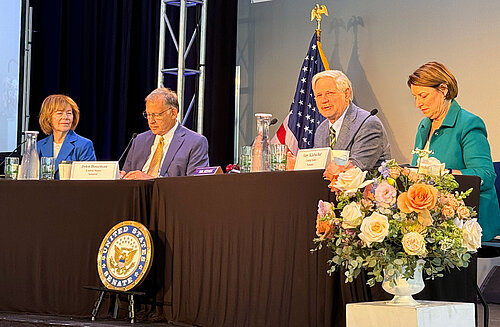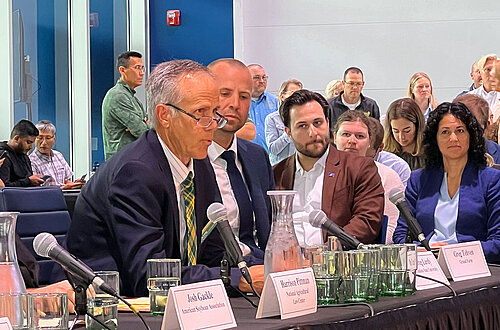NDSU research expertise featured at U.S. Committee field hearing

NDSU’s expanding role in advanced agricultural technology and research was featured Thursday at the United States Senate Agriculture Appropriations Committee Field Hearing hosted by Sen. John Hoeven at theGrand Farm Innovation Campus in Wheatland, N.D. Greg Lardy, the Joe and Norma Peltier Endowed Vice President for North Dakota State University Agriculture, testified at the field hearing on behalf of NDSU. U.S. Senators Amy Klobuchar and Tina Smith from Minnesota and John Boozman of Arkansas joined Hoeven at the hearing.
Hoeven announced in June that the committee hearing would be held locally and would emphasize the agriculture partnerships between research institutions such as NDSU, private businesses, federal agencies and other local organizations.
Lardy’s testimony focused on NDSU’s expanding role in those areas.
“It should be no surprise that agriculture and food production are changing rapidly. A growing global population, much of which is emerging from poverty, is demanding additional and higher quality foods,” Lardy said. “North Dakota is uniquely positioned to play a vital role in providing those foods. As a state that produces over 40 different agricultural commodities and leads the nation in a dozen of those, our producers feed the world. NDSU plays a key role in this effort through education, research and extension programming.”
As a land-grant research institution, NDSU’s influence on agriculture continues to grow across the state, evidenced by the research and work conducted at seven research extension centers across North Dakota.
“The $2 million we secured for a new ag research policy center at NDSU will help ensure that local, Midwestern expertise is guiding policymakers in Washington,” said Hoeven in a press release in April. “In addition, we’ve provided more than $50 million for high-priority research initiatives across North Dakota, helping to strengthen crop genetics, prevent disease, improve yields and reduce costs for our producers.”

“NDSU is also a leader in precision agriculture,” Lardy said. “We collaborate with the U.S. Department of Agriculture’s Agricultural Research Service, private industry, and other organizations to accelerate the development of advanced agricultural technologies. This relationship is enhanced with the test bed provided by Grand Farm. Thanks to Senator Hoeven for his efforts to strengthen this relationship even more. By investing in technology that allows more rapid data transfer and utilization of data collection across broad geographic areas, our scientists can rapidly solve various vexing problems for farmers and ranchers.”
A significant partnership between NDSU and FARMS (Food systems Adapted for Resiliency and Maximized Security) seeks to enhance North Dakota’s reputation as a national leader in AgTech research.
“Greg Lardy and Greg Tehven, chief executive officer of Emerging Prairie, shared how public-private partnerships such as ours drive agricultural innovation and bring together actionable research by integrating Tribal agricultural knowledge and the latest technologies to create sustainable solutions that equitably strengthen rural economies and drive generational change," said Hollie Mackey, FARMS chief executive officer. "I was proud to see this impactful work highlighted today."
In addition, to FARMS, another partnership led by NDSU with great potential to deliver research-driven discoveries to the nation is NDSU’s new Food, Energy and Water Security (FEWS) initiative. With a goal of improving sustainability and resiliency in those areas, FEWS will promote energy sustainability, studying humans’ impact on water systems, supporting Tribal food sovereignty, and improving health and nutrition.
Lardy and Colleen Fitzgerald, vice president for research and creative activity at NDSU, were the driving forces behind the initiative. FEWS issues are some of the primary focuses that NDSU researchers are working to resolve by advancing innovative solutions in those areas.
According to Fitzgerald, the partnership NDSU has with USDA continues to grow, seeing an increase in funding of 57 percent year over year to $32.2M in the most recent fiscal year (2024).


